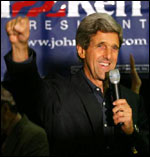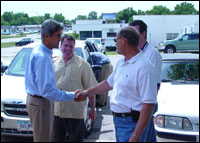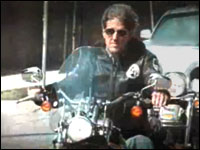
Kerry power.
Photo: Kerry for President.
He has the jaw and build of Paul Bunyan; he windsurfs, kite-boards, and snowboards; and he’s married to Teresa Heinz, one of the most powerful environmental philanthropists in the country. He has his finger on every hot-button environmental issue in D.C., from helping to lead the Senate campaign against drilling in the Arctic National Wildlife Refuge to pushing for improved fuel-efficiency standards to advocating for an aggressive renewable energy development plan. With the exception of that Harley Davidson Wide Glide he likes to parade at campaign events, Sen. John Kerry (D-Mass.) looks to be the ultimate embodiment of Beltway eco-chic.
But what goes on behind the glossy-green public image? What does this presidential candidate’s environmental record really look like after his nearly 20 years in the U.S. Senate? Rifle through the archives of the League of Conservation Voters, and you’ll find he gets an A+ — literally. Kerry has a 96-percent lifetime voting record, outscoring all of the other candidates. (Connecticut Sen. Joe Lieberman comes in second with 93 percent.) Despite concerns that Kerry is a limousine liberal, there seem to be few contradictions between his environmental image and his track record — a couple of peccadilloes aside. (Beyond his Harley, which he says he’ll never relinquish, Kerry the renewables advocate is hesitant to support the Cape Wind project in his own state, likely influenced by his wealthy, beachfront-owning constituents who oppose the wind-energy farm.)
Late one recent night (at 11 p.m. EST, to be exact), Grist tracked Kerry down on the campaign trail — rather, in the campaign jet, flying from Colorado to Boston — to discuss his environmental record, President Bush’s “New Environmentalism,” and balancing his vision for a clean-energy future with his passion for his motorcycle.
Hi! It’s John Kerry. I want to warn you that I’m in the air — 50,000 feet above Colorado — so the signal may come in and out.
Great. Let’s start with your reaction to Bush’s environmental record.
Abysmal. Worst record in modern history.
Can you elaborate? What do you find most alarming?
All of it. It’s so vast. When you add it all up, it’s a stunning assault on environmental common sense. You begin with global warming, which is one of the most serious challenges of all, you add it to the ocean pollution and fisheries challenge that we face. And then you couple that with the quality of our rivers and streams and lakes, the air-quality issues of the United States, the forest and mining policies, the drilling policies, arsenic in our drinking war, and you just have an unbelievable series of backward-moving measures.
There is not one proactive, genuinely thoughtful, positive policy that you can point to that George Bush and his administration are advocating. You cannot find one area where they are genuinely advocating something. They have their Healthy Forests thing; it’s a fraud. Clear Skies; it’s a fraud. It’s all very Orwellian — remember in 1984 where “war is peace”? That’s the Bush environmental policy.
You’ve proposed a very aggressive energy plan, advocating a Renewable Portfolio Standard that sets a mandatory industry target to produce 20 percent of the nation’s electricity supply from renewable fuels by 2020. Can you tell us how, practically speaking, we are going to get from here to there, given that right now as a nation we’re producing less than 1 percent of our energy from non-hydro renewables?
Yeah, but in California it’s 13 percent. California is the sixth-largest economy in the world. That’s the full mix — hydro, geothermal, solar, wind, biomass, everything. In other states it’s only 1 or 2 percent, but you can advance very quickly because there are enormous gains — both economic and environmental — to be made in many of those states. But we have to encourage the investments with incentives from a state and federal level.
Wasn’t that proposal essentially laughed out of the U.S. Senate as economically untenable?
No. It was laughed at by the special interests who wrote the Republican energy bill. That’s just the industry resisting. It has nothing to do with reality. The special interests come in and spend huge sums of money to get Washington to continue spending money on the old way of doing things. We spend incredible amounts of your money to do for the oil and gas industry what they could afford to do for themselves. And we shortchange the alternatives, the new ideas. They fight to drill in ANWR, they [take money away from] new energy — it’s that simple. The reality is that you can achieve a 20 percent Renewable Portfolio Standard fairly quickly if you put the kind of money into alternatives that you put into existing forms of energy.
Can you take us through the economic advantages of your plan and how you would achieve it?
Once a certain amount of money is allocated by government to do something, people generally find ways of getting at it. The government incentivizes people to move in that direction. It creates marketplaces. You make it profitable for people. You implement the RPS [Renewable Portfolio Standard]. You set up a series of joint ventures, of grants, of tax credits. You make requirements that companies have to produce a percentage of their electricity from alternatives and renewables, and that creates a market; then those states start bidding for companies to provide it. It’s a different way of thinking, and it can lead to a better policy — with goals set by leaders in policy-making with incentives to help get us there. It’s exactly what we did with NASA and the space program. They’ll do requests for proposals and then those companies say, well, 20 percent equals X amount of income and it’s in our economic interests to get in the arena and compete. They’ll start looking at ways to produce it. And you commit federal funds to help that process along.
So it becomes profitable for companies when you commit federal funds?
Correct. And committing those federal funds will, in the long term, create jobs and grow the economy. Just like the military did in the Cold War, or the space program.
In the face of war and terrorism, environmentalism has dropped considerably in the polls as a primary issue of public concern. How can we get this issue back on the map?
First of all, those polls often don’t reflect people’s real feelings. Polls are a snapshot of a moment. Poll results can be skewed by how questions are worded and how they are asked. When I say to audiences: Domestic, renewable sources are urgently needed now because they are entirely under our control, no foreign government can embargo them, no terrorist can seize control of them, no cartel can play games with them, no American soldier will have to risk his or her life to protect them — audiences respond. I find that all over the country, people are responding to environmental concerns as I talk about it.
What about beyond energy issues? Or is that the issue people respond to most?
There are plenty of issues that touch a chord with people. Take, for instance the 80,000 chemicals registered for use in the United States. Fewer than 10 percent of them have been tested. Daily we are exposed to hundreds, even thousands, of them — in the food and products we buy, in cleaners and cosmetics and children’s toys. Some of these are linked to cancer and birth defects, and yet still the EPA and FDA don’t yet have the authority and capacity to investigate, monitor, and test the long-term risks of these compounds. People respond to this.
They also respond to what’s happening to their towns and neighborhoods. The federal government needs to help cities across the nation, like the old manufacturing towns all across New England, build the infrastructure that will keep sewage and polluted runoff out of our rivers, lakes, and harbors. We must leverage a new urban strategy in America to plan spaces — build community and avoid the endless sprawl that robs us of our public spaces — and ultimately revive the urban center as one of the best places to live and raise a family. You’re telling me Americans don’t care about these things?
Can you elaborate on how, when you travel around, you energize average citizens around these issues, and how central such issues will be to your campaign?
It’s very central. I tell them it’s critical to our own survival. It’s critical to our legacy, to the next generations. People connect to that. People understand it. They just want reasonable proposals. They don’t want doomsday extremism. They want optimism and real, practical solutions, and we can drive that — with science, technology, research, with very practical efforts. There’s a lot we can do. It’s empowering for Americans to hear what we can do.

On the campaign trail in Iowa.
Photo: Kerry for President.
It’s interesting to me that unlike other candidates, you’ve actually gone to Iowa, for instance, which has a strong United Auto Workers base, and argued for CAFE [Corporate Average Fuel Economy] standards, putting yourself in conflict with what we traditionally think of as anti-environmentalists.
You have to tell the truth and let the chips fall where they may. But the truth, in this case, should be appealing to UAW’s workers: I believe I can put them to work. I believe I can have them working making cars; they can just make cars that are more efficient. It’s not that hard. We can make cars that use biomass ethanol, cars that use hybrid-electric engines, that get 100 miles to the gallon by just being smarter. Somebody has to lead us there.
So you have the same message for, say, an autoworker in Iowa as you would for a card-carrying environmentalist in Portland, Ore. — this message that new, clean industries can energize the marketplace and save the environment at the same time?
The message is the same: We can create jobs and people don’t have to fear good environmental practices and we can show people how we’ll create the jobs and in fact they’ll be better off. I’d rather sell more American cars that are fuel-efficient than have people turn to Japanese cars and German cars, and right now they are out-producing us in this area. So the way to sell the American cars is get efficient. I’m willing to provide incentives that help people do that.
How do you consider yourself different from other candidates on the environment?
This fight is such a part of who I am; it’s not just an issue on my resume. I think I have the longest, strongest, clearest, most accomplished record on the environment of any of the candidates running. I began in 1970 when I spoke at Earth Day. I was chairman of Earth Day New England in 1990. I chaired a governor’s task force on acid rain when I was a lieutenant governor and we developed a national platform for acid rain. I’ve been chairman of the Oceans and Environment Subcommittee of the Commerce Committee. I’ve rewritten our fisheries laws, our marine mammal protection laws, our plastic pollution laws, our flood insurance protection laws, our coastal-zone management laws. I’ve lead on tuna/dolphin safety issues, on banning driftnet fishing. I’ve been to all the major conferences — Rio, Buenos Aires, Kyoto, The Hague — on global warming. I led the fight to stop Newt Gingrich from attacking the Clean Air and Clean Water acts in 1996, and I’ve led the effort in the Senate to stop the drilling in the Arctic wildlife refuge. I put together the first-ever sustainable development conference in Asia. I am proud of my record of accomplishment on the environment.
You have a 96-percent lifetime voting record on the environment at the League of Conservation Voters, which is about as good as it gets. Yet Al Gore also had a very strong record coming into office, and he wasn’t able to maintain it. What would you say to environmentalists who are disappointed that Al Gore wasn’t able to put the environment first?
I would never walk away from this issue, and the environmental community can make a statement by joining me. I’ve been building my record for 19 years. It’s a central premise of my career and who I am as a person and I’m not about to walk away from it.
Can you elaborate? Why do you think Gore strayed from his strong environmental record during his vice presidency?
I don’t have any comment on what happened with Gore. I just don’t know. I can only tell you what I will fight for. I think my record is long and clear and I’d be betraying myself if I didn’t continue forward with it. I just couldn’t do that.

Kerry windsurfing.
Photo: Kerry for President.
You are thought of as an avid environmentalist and you’ve built a reputation as an outdoorsman. Can you talk about your personal relationship to the environment? What made you care about these issues and how do you practice environmentalism in your own life?
My mother was a strong environmentalist. She passed to all of us a great appreciation for the world around us. She started nature walks at our schools. She took us out in the early morning and taught us about birds. She read us Thoreau and Emerson and later Rachel Carson. We were always hiking and walking and learning about the outdoors, so from a very early age I had a powerful sense of its importance.
How do you practice it in your own life? Do you have solar on your roof? Do you drive a hybrid car? Do you spend much time outdoors?
My wife Teresa is very deeply involved in the movement. That’s how we really got to know each other; we met at an earth summit. Teresa does so much. Through her philanthropy she built a green, self-sustaining building in Pittsburgh, she works on international environmental issues, and she is really visionary in connecting the dots between the environment and public health.
As for personal choices, years ago I got rid of my SUV and downscaled to a minivan. (We haul around a lot of staff and reporters on the trail, so a sedan isn’t an option.) We don’t have solar yet, but Teresa just built an office of sustainably harvested wood. I’m a nudge about recycling, even when camping or enjoying the outdoors. Teresa and I go for great long walks in Idaho [where we have a home] under the mountains. I’m an avid windsurfer, kite-boarder, snowboarder, hiker, you name it. If there’s wind, water, snow, trails, I want to be there. I want to taste it, feel it. I crave nature. Even on the campaign trail, I’ll try to take a moment to go for a walk by the water in places like Seattle or Chicago.

It’s not a motorcycle, it’s a chopper.
Photo: Kerry for President.
What about vices — like that Harley we often see you driving to campaign events?
I don’t consider that a vice. It’s very fuel-efficient and economical and better than a big car.
But emissions on Harleys are significantly worse than cars. Does that concern you?
I haven’t heard that about my Harley. But if it’s a vice, it’s one I don’t think I can quit. Sorry.
The Bush administration keeps talking about a “New Environmentalism” based on incentives and market-based solutions. Do you agree with this shift away from command-and-control regulations?
Well, yes. You don’t want to do everything by command and control, though that doesn’t mean eliminating it entirely. You want to create incentives that condition markets and people’s behavior toward better environmental performance. You have to convince, for instance, a paper mill to be more fuel-efficient because it will save them money. We can actually show a company how they can save money by polluting less and, in the case of cap-and-trade programs, actually turn a profit. This is happening. There are all kinds of ways of harnessing people’s better instincts.
So market-based solutions should be a critical part of future environmental regulations?
Absolutely. But remember, we need carrots and sticks. Some behavior can be regulated, some can’t. Some things you can’t bend on. For example, I believe that instead of letting the Superfund go broke, sticking taxpayers with the tab, and forcing communities to live with toxic sites, we should restore the polluter-pays principle and get the poisons out of our neighborhoods. It’s fair, it’s just — and, yes, it’s a mandate that polluters have to pay to clean up their mess.
Some [issues are] better incentivized. The trading mechanism we developed for sulfur dioxide [to clean up acid rain] was very effective. It used market forces to produce a very good result. We need to build on that.
Where do you stand on the Cape Cod wind farm controversy in your own state?
I think we need a siting process. I think there has to be a legitimate siting agreement and we have to wait and see what the environmental impact statement suggests.
So are you undecided?
No. I am generically in favor of wind power but I want to know whether this is the right place. There is a lot of opposition, obviously, a lot of people concerned about it. What’s the impact going to be on the ecosystem? I want to know. I think we have to have a clear process by which we’re going to get these things sited. I don’t think we can let everyone run around plunking [wind farms] down wherever they want.
What would you do as president about the Kyoto Protocol on global climate change? Would you submit it to the Senate?
No, not in its current form. It does have some flaws. It doesn’t ask enough of developing nations, the nations that are going to be producing much greater emissions and which we need to get on the right course now through technology transfer. I would reopen the negotiating process, fix the flaws, and move forward.
I want to address this issue of balancing the concerns of the environment with the concerns of big business. The Bush administration has lead us to believe that these two goals of growing the economy and protecting the environment are radically incompatible. This, of course, is bogus, but still you can’t deny that Big Business fundamentally does not like environmental regulations. How would you balance these issues as president?
You have to bring business to the table and show them how it’s in their interest and how you can work it in a way that doesn’t put them out of business. If you do things without incentives, you can really hurt business people. That’s why, for example, I’ve put forward a plan on fuel efficiency that includes incentives for the industry, not just mandates. Carrots and sticks. We have to have a reasonableness in the dialogue. We have to communicate to them both the imperative of doing these things and finding a way that can satisfy the environmental demand of doing it with their business needs — addressing how they will capitalize, what kind of technologies they will use. In some cases they may have a legitimate argument for how we may have to have some kind of federal assistance in the process. Take the Superfund example — you can adhere to the polluter-pays concept even as you help companies through the process. There are ways to get things done if leadership wants to get them done. You have to lead people to a better place.
What’s your opinion on the nomination of Michael Leavitt, the Republican governor of Utah, to head the U.S. EPA? Are you going to block his appointment?
I don’t know yet. Leavitt’s record as governor doesn’t strike me as especially balanced. And I’ll tell you this: We shouldn’t consider confirming him until we force the administration to share the truth about the EPA report on the air safety at Ground Zero in New York City. The apparent whitewash that happened after 9/11 is shocking. Hardball is the only thing this administration responds to.
But whether it’s Leavitt or someone else at EPA, my opinion is fundamentally that the experience that Christie Todd Whitman had proved that it really doesn’t matter who is there. They [Bush administration members] are going to be bad, they are not going to let anybody be creative. Dick Cheney and old thinking on the environment call the shots here. Period. What they did to Christie Todd Whitman was inexcusable. They found a token environmentalist and they wouldn’t let her be who she was for so many years. We need a new president, not just a new EPA chief.

